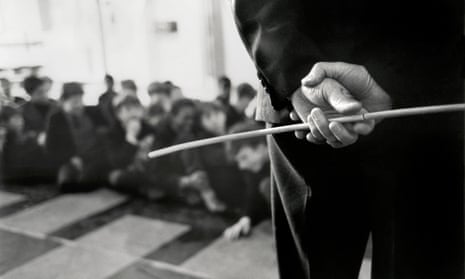The beatings described by victims of John Smyth, who ran Christian summer camps in the late 1970s, are entirely familiar to me. I’m sure the archbishop of Canterbury, as he has said, knew nothing of them when he helped out at those camps as a teenager. But those of us who were victims of similar beatings know this wasn’t simply the activity of a few rotten apples – though rotten apples there were. The problem was deep in the educational philosophy of the public school system, and the poisonous ideas it developed about the sort of men required to run the British empire.
Ted Robertson, the headmaster of my prep school, Hollingbury Court in Sussex, had a collection of canes in his study. Thick ones; thin, whippy ones; long and short. Different materials. For hours I would stand in a gloomy wood-panelled corridor, next to a creepy chapel, waiting for the beatings. This could be several times a week. Talking after lights out, talking at meal times, running in the corridor, wearing the wrong bit of uniform – these and other outrages were all punishable with a good thrashing. “Bend over, boy.” I would focus on a spot on the floor. The most important thing was not to wince. And I wasn’t going to give those bastards the satisfaction of seeing me cry.
Often we would go to bed with underpants drenched in blood. And in the dormitories, named after the headmaster’s military heroes – Drake, Trenchard, Marlborough, Churchill – we would whisper to each other about the sadism and compare the lines on our bums as wounds of pride and solidarity. I was beaten like this throughout the 1970s, with canes and bats and shoes and clothes brushes, from the age of seven all the way through to when I was 12. The pain doesn’t last so long. But a burning anger settles in your soul.
It is safe to assume that human beings have thrashed each other, and their children, throughout their history. But the popularity of beating children in the British educational system, and the idea that it had moral, character-forming properties, cannot be understood without the rise of so-called muscular Christianity during the second half of the 19th century. Fearing that Anglo-Catholic Christianity, with all its poetic longing and Mary worship, had made men effeminate and unfit for service in the empire, novelists such as Thomas Hughes (Tom Brown’s School Days) and Charles Kingsley (Westward Ho!), and increasingly the Protestant public school establishment, began to promote a version of manly Christianity through the character-forming powers of chapel, rugby and the cane.
Through sport and physical discipline the body became the battleground of the juvenile soul, with the lick of the cane regarded as the ultimate form of moral purgation. One pupil in Tom Brown’s School Days who had been thrashed by the headmaster returned, later in life to thank him, “saying it had been the kindest act which had ever been done upon him, and the turning point in his character.”
Tom Brown’s School Days was published in 1857, the same year as the Indian Mutiny against British rule. Part of the purpose of empire was to promote evangelical Christianity. But the empire was no place for effeminate Christians. And so the ability to take a good beating became training for the sort of mental toughness that was required to rule the world. Indeed, the cane became so associated with moral education that even when judicial corporal punishment was banned for adults, in 1947, it did not become illegal for all schoolchildren in England and Wales until 1999. Sports day was at the heart of my school. And chapel. And lots of marching to pompous military bands. And the cane. This is how people like Ted Robertson and John Smyth spread their worldview.

Anne Atkins, writing in yesterday’s Telegraph, describes the young men who attended Smyth’s camps as “Christian, good-looking, sporty, decent, public school and Oxbridge educated”. This ideal of manly Christian decency, all side partings and blazers, survives. It’s why the evangelical Alpha Course uses someone like Bear Grylls as its advertising poster boy. And it’s why evangelicals retain the middle-class Victorian fear of homosexuality – because it doesn’t fit with their ideal of wholesome masculinity.
As I said, the current archbishop of Canterbury clearly bears no responsibility for the behaviour of sadists involved with Christian camps in the 1970s. Nonetheless, his particular brand of Eton/Alpha Course Christianity is cut from the same cloth as the muscular Christianity of the 1850s. And this is why the Church of England hierarchy remains obsessed with maintaining the Anglican communion (ie what’s left of the empire) – it is no coincidence that Smyth fled to Zimbabwe and South Africa – and why it can’t get past an over-fascination with homosexuality. The archbishop is not to blame for Smyth’s sins. But he is still too much a part of the world that made him.
The moral formation I received from my school beatings was almost entirely the opposite of what was intended. They gave me a lifelong problem with authority and a kneejerk identification with victims. Which is probably why I am prepared to be a little unfair about the archbishop and his proximity to these horrible Christian camps. He is a decent man.
But my problem is with the whole idea of evangelical decency. It takes me back to the so-called decency of the man who caned me, and the sickness I felt in my stomach as a little boy, waiting outside that chapel in a gloomy wood-panelled corridor. This was more than 40 years ago – but I still don’t have it in me to forgive him for what he did to me.

